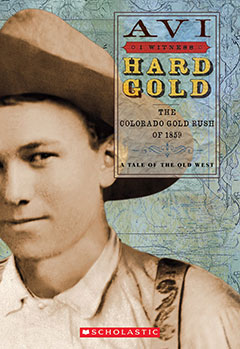 My I Witness series concept was simple enough: Fact-driven historical fiction, illustrated like a text book. The notion, frankly, was to make history that much alive for my readers: Strong fiction, with many contemporary images, maps, diagrams, etc. Iron Thunder (the Civil War battle of the iron-clads, the Monitor and the Merrimac) was the first volume. Hard Gold was the second.
My I Witness series concept was simple enough: Fact-driven historical fiction, illustrated like a text book. The notion, frankly, was to make history that much alive for my readers: Strong fiction, with many contemporary images, maps, diagrams, etc. Iron Thunder (the Civil War battle of the iron-clads, the Monitor and the Merrimac) was the first volume. Hard Gold was the second.
Whereas the 1849 California gold rush is fairly well established as part of our national mythology, the 1859 Colorado gold rush is not so well known, other than perhaps “Pikes Peak or Bust,” a refrain from the time. Hard Gold tells the story of young Early Wittcomb, Iowa-born, and his attempt to locate his gold-seeking Uncle Jesse in the Rocky Mountains. The novel is, in its fashion, a Western.
Early will cross the Great Plains until he reaches newly founded Denver, and then on into the mountains, to Gold Hill. Gold Hill, which once had a population of thousands, still exists, with its current population of perhaps two hundred.
My novel was written in the form of a diary, a form which many pioneers used to record their own journey west. Indeed, there is a huge library of 19th Century pioneer travel literature; diaries, memoirs, letters, newspaper records—along with a multitude of pictorial records. Whereas many of us derive our understanding of the great trek west from movies, the reality is much more complex and fascinating.
To begin, many of America’s gold-rushes—and there have been many—were powered less by the desire for gold, as such, as by periodic economic hard times Back East. That is to say, the rushes were not about the romance of the west, but more about saving the farm. And the numbers of people who went west were huge. I can recall one diary entry which records how, at night, the lights from wagons on the trail, extended out in an unbroken line for as far as one could see.
There are countless tales about the people who migrated from east to west. There are as many stories about the Indians, who were so helpful to those who traveled, until they grasped that their land was being taken away. Tales of Mormons—heading for Salt Lake City—who pushed wheelbarrows across the plains. Tragic tales about the parents who lost children when their kids wandered into the tall prairie grass, and could not be found. The children who lost their parents to illness; what became of them?
The search for gold was never easy. Hence, HARD gold. Since I live in Colorado, the research was not particularly difficult. Most interesting was to go to the lost places where the world was so different. And, yes, as the notes in the book suggest, I did pan for gold. I just might have found some. Not enough to pay the mortgage, just enough to know that getting it was very hard.
1 thought on “Story Behind the Story #56: Hard Gold”
Why are there no more books in this series, and why are they out of print?